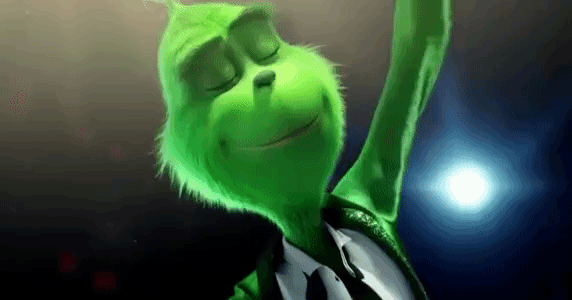The Grinch is bright and bouncy but burdened by a pointless backstory

The bouncy green Grinch from Dr Seuss’ beloved children’s book is back on the big screen in a stretched but nevertheless fun new film, writes critic Sarah Ward.
For more than six decades, How the Grinch Stole Christmas! has ranked among Dr Seuss’ most famous creations. Brought to life with the author’s lively illustrations and penchant for rhymes, the grouchy titular character despises all things Christmas – the gifts, the fuss, the people fussing – until, after robbing the inhabitants of Whoville of everything related to the occasion, he realises that there’s more to it than decorations, trees, stockings, feasts and presents. The curmudgeon sees the kindness and joy in others, and starts feeling it himself. As well espousing the true meaning of the season, the illustrated parable champions simply being good to one another. ’Tis the right time for it, and all that.
Across its 69 pages, How the Grinch Stole Christmas! is simple, sweet and entertaining, traits that the first adaptation of the story – an animated 1966 TV special with Boris Karloff as the Grinch – aptly mirrored. Alas, padding the tale out to feature film length has never proven completely successful. 2000’s live-action take leaned a little too far into Jim Carrey’s rubbery interpretation of the character, while the latest version ramps up the slapstick while adding a needless backstory that threatens to undercut the text’s message.

Voiced by Benedict Cumberbatch in sneering mode, the Grinch lives atop Mount Crumpit, literally looking down on the happy Whos as they start getting merry. His loyal dog Max is his only pal, although his closest neighbour Bricklebaum (Kenan Thompson) thinks they’re best buddies despite the Grinch’s unfriendly ways. When the widespread Christmas shenanigans reach their apex, the pea-coloured creature just can’t stand it, so he hatches his devious scheme. At the same time, six-year-old Cindy Lou (Cameron Seely) has a plan of her own: with her single mother (Rashida Jones) constantly tired and overworked, she desperately wants Santa to help.
Always the child who catches the Grinch a-grinching on Christmas Eve, Cindy Lou’s story gets a little flesh. Recognising both solo parents and over–stressed mums in general, it’s a warm-hearted and timely update, with writers Michael LeSieur (Keeping Up with the Joneses) and Tommy Swerdlow (Snow Dogs) clearly aware of who’s taking kids to see this family-oriented affair. But, as directed by Yarrow Cheney (The Secret Life of Pets) and Scott Mosier (best known for producing Kevin Smith’s films), the movie’s other new inclusion is simplistic even for a simple tale. In fact, its changes are designed to add more depth, yet ultimately do the opposite.
Old Grinchy isn’t just cruel, cranky and unhappy here. He’s not just a mean, cave-dwelling monster (and his cave is quite nicely appointed, with books, roomy spaces, and handy Rube Goldberg-like devices that make his morning coffee and breakfast). Seuss implored readers “please, don’t ask why!”, but his iconic antagonist has been given a deep-seeded reason to hate Christmas. In the process, The Grinch becomes less about discovering the value of family, community and togetherness, preferring to posit that there’s always a reason that bad things happen.
Children’s entertainment needn’t shower young minds in bleakness; however sugarcoating has long been Illumination’s game. The animation studio’s biggest hits, the Despicable Me movies, all spin the same story, with their self-described villain not really all that villainous – and given a childhood source for his wicked ways. But The Grinch doesn’t just avoid the idea that the world isn’t always jolly, nor people along with it. Rationalising the Grinch’s cantankerousness makes him a problem to be solved and a broken entity to be explained and fixed, rather than someone who’s heart grows three sizes because he genuinely learns something.
It’s a slight change but a noticeable one, in a film that’s slight and stretched from start to finish. While the main storyline rings hollow as a result, The Grinch retains its sweetness through young Cindy’s plight. Elsewhere, it remains bright, busy, bouncy and bustling with straightforward sight gags, aka the epitome of easily digestible all-ages entertainment. In other words, it’s a standard Illumination movie right down to Pharrell Williams’ involvement (as the narrator), just with more snow and Christmas decorations, and fewer minions.

















